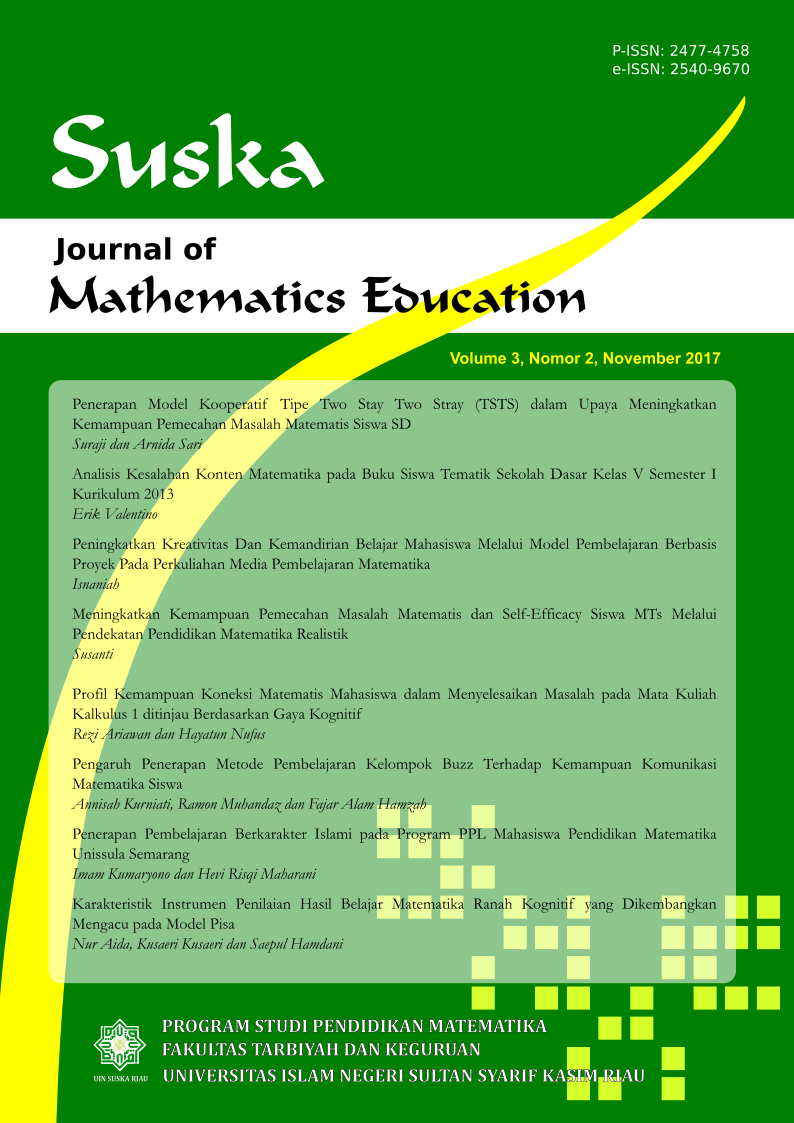Rekognisi dan Kepuasan Mahasiswa Matematika Mengikuti E-learning di Tengah Pandemi COVID-19
Abstract
E-learning semakin banyak digunakan selama pandemi COVID-19, namun dampak dari perubahan metode pembelajaran ini pada mahasiswa belum diketahui. Penelitian ini bertujuan untuk mengevaluasi rekognisi dan kepuasan mahasiswa pendidikan matematika terhadap E-learning selama COVID-19. Angket kuesioner dibagikan kepada 59 mahasiswa pendidikan matematika sebagai responden melalui aplikasi google form dan whatsapp. Kuesioner membahas rekognisi dan kepuasan siswa dengan menggunakan 16 pertanyaan tertutup. Hasil dari penelitian ini adalah Rekognisi dan tingkat kepuasan E-learning baik dengan mayoritas mahasiwa setuju bahwa E-learning memuaskan untuk memperoleh pengetahuan, namun belum sepenuhnya efektif untuk meningkatkan kompetensi mereka.
Full Text:
PDFReferences
Abbasi, M. S., Ahmed, N., Sajjad, B., Alshahrani, A., Saeed, S., Sarfaraz, S., Alhamdan, R. S., Vohra, F., & Abduljabbar, T. (2020). E-Learning perception and satisfaction among health sciences students amid the COVID-19 pandemic. Work (Reading, Mass.), 67(3), 549–556. https://doi.org/10.3233/WOR-203308
Artino, A., & II, K. (2012). Exploring the complex relations between achievement emotions and self-regulated learning behaviors in online learning. The Internet and Higher Education, 15, 170–175. https://doi.org/10.1016/j.iheduc.2012.01.006
Bayham, J., & Fenichel, E. P. (2020). Impact of school closures for COVID-19 on the US health-care workforce and net mortality: A modelling study. The Lancet. Public Health, 5(5), e271–e278. https://doi.org/10.1016/S2468-2667(20)30082-7
Chitra, A., & Raj, M. (2018). E-Learning. Journal of Applied and Advanced Research, 3, 11. https://doi.org/10.21839/jaar.2018.v3iS1.158
Faizi, R., Afia, A. E., & Chiheb, R. (2013). Exploring the Potential Benefits of Using Social Media in Education. International Journal of Engineering Pedagogy (IJEP), 3(4), 50–53.
Fredricks, J. A. (2011). Engagement in School and Out-of-School Contexts: A Multidimensional View of Engagement. Theory Into Practice, 50(4), 327–335. https://doi.org/10.1080/00405841.2011.607401
Gerhardt, L. A. (2005). The future of distance learning—The process and the product. 2005 6th International Conference on Information Technology Based Higher Education and Training, F1A/1-F1A/2. https://doi.org/10.1109/ITHET.2005.1560265
https://plus.google.com/+UNESCO. (2020, Maret 24). COVID-19 Educational Disruption and Response. UNESCO. https://en.unesco.org/news/covid-19-educational-disruption-and-response
Lepper, M., Corpus, J., & Iyengar, S. (2005). Intrinsic and Extrinsic Motivational Orientations in the Classroom: Age Differences and Academic Correlates. Journal of Educational Psychology, 97, 184–196. https://doi.org/10.1037/0022-0663.97.2.184
Linjawi, A. I., & Alfadda, L. S. (2018). Students’ perception, attitudes, and readiness toward online learning in dental education in Saudi Arabia: A cohort study. Advances in Medical Education and Practice, 9, 855–863. https://doi.org/10.2147/AMEP.S175395
Murphy, M. P. A. (2020). COVID-19 and emergency eLearning: Consequences of the securitization of higher education for post-pandemic pedagogy. Contemporary Security Policy, 41(3), 492–505. https://doi.org/10.1080/13523260.2020.1761749
Nortvig, A.-M., Petersen, A. K., & Balle, S. H. (2018). A Literature Review of the Factors Influencing E-Learning and Blended Learning in Relation to Learning Outcome, Student Satisfaction and Engagement. Electronic Journal of E-Learning, 16(1), 46–55.
Pekrun, R., & Stephens, E. J. (2012). Academic emotions. Dalam APA educational psychology handbook, Vol 2: Individual differences and cultural and contextual factors (hlm. 3–31). American Psychological Association. https://doi.org/10.1037/13274-001
Rodrigues, H., Almeida, F., Figueiredo, V., & Lopes, S. L. (2019). Tracking e-learning through published papers: A systematic review. Computers & Education, 136(1), 87–98.
Shin, K. E., & Newman, M. G. (2019). Self- and other-perceptions of interpersonal problems: Effects of generalized anxiety, social anxiety, and depression. Journal of anxiety disorders, 65, 1–10. https://doi.org/10.1016/j.janxdis.2019.04.005
Smith, D., & Ayers, D. (2006). Culturally Responsive Pedagogy and Online Learning: Implications for the Globalized Community College. Community College Journal of Research and Practice, 30, 401–415. https://doi.org/10.1080/10668920500442125
Solangi, Z. A., Shahrani, F. A., & Pandhiani, S. M. (2018). Factors affecting Successful Implementation of eLearning: Study of Colleges and Institutes Sector RCJ Saudi Arabia. International Journal of Emerging Technologies in Learning (IJET), 13(06), 223–230.
Tempelaar, D., Niculescu, A., Rienties, B., Giesbers, B., & Gijselaers, W. (2012). How achievement emotions impact students’ decisions for online learning, and what precedes those emotions. Internet and Higher Education, 15, 161–169. https://doi.org/10.1016/j.iheduc.2011.10.003
Van Wart, M., Ni, A., Medina, P., Canelon, J., Kordrostami, M., Zhang, J., & Liu, Y. (2020). Integrating students’ perspectives about online learning: A hierarchy of factors. International Journal of Educational Technology in Higher Education, 17(1), 53. https://doi.org/10.1186/s41239-020-00229-8
DOI: http://dx.doi.org/10.24014/juring.v4i2.13802
Refbacks
- There are currently no refbacks.
Juring (Journal for Research in Mathematics Learning)
Universitas Islam Negeri Sultan Syarif Kasim Riau
Indexed by:













